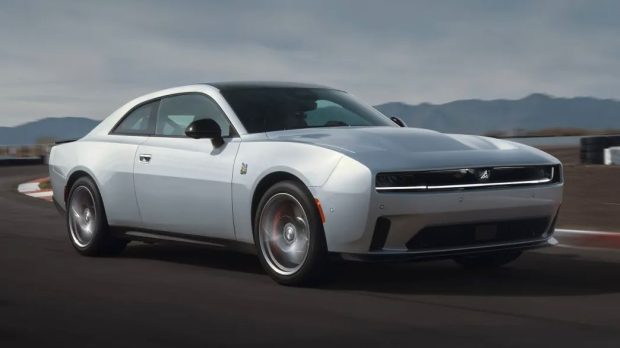
Dodge took a huge leap of faith turning the V8 Charger into an electric counterpart. The thing has to sound right to win over new and existing fans. The Fatzonic exhaust should produce up to 126dB sound levels, which is loud to say the least. But, is iit convincing? The video below shows the early versions of the technology.
The new Daytona is built on the latest Stellantis STLA Large platform with 800-volt power and two-speed transmission for the top model. The Scat Pack and Stage 2 models produce 500kW and 850Nm of torque, with a 0-60mph time to 3.3 seconds. A 3.0L twin-turbocharged inline six-cylinder version is still expected to do a sub 4 second 0-60 time.
View this post on Instagram
User Experience
Drivers can customize the sound levels, allowing for a personalized driving experience. This feature ensures that the electric rumble can be as subtle or as pronounced as desired, catering to a wide range of preferences.
Performance Metrics and Impact
Enhancing Driving Dynamics
The electric rumble is not merely an aesthetic feature; it enhances driving dynamics by providing auditory feedback that correlates with the car’s performance. This connection between sound and speed helps drivers maintain awareness of their driving conditions.
Safety and Pedestrian Awareness
The generated sound plays a role in safety, especially in urban environments. Electric vehicles are notoriously quiet, which can pose risks to pedestrians. The Charger Daytona’s electric rumble addresses this issue by ensuring the Daytona is audible even at low speeds.
The introduction of the electric rumble in the Dodge Charger Daytona sets a new benchmark in the automotive industry. It demonstrates that electric vehicles can retain the emotive qualities of traditional muscle cars while offering the benefits of modern electric technology.
Industry Adoption
As the industry moves towards electrification, the innovations seen in the Charger Daytona are likely to inspire other manufacturers. The integration of sound generation systems could become a standard feature in future electric muscle cars, enhancing their appeal to traditional car enthusiasts.
One element consistent throughout the Charger’s history is the car’s weight. The Dodge Daytona EV weighs in at 2648kg, so it is no lightweight.
Prices should start around $50,000.
The post The Technology Behind the Electric Dodge Charger Daytona appeared first on Muscle Car.

